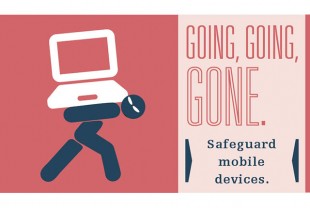October is National Cybersecurity Awareness Month, and throughout the month Rice’s Office of Information Technology is sharing tips and information about how to stay safe and be a conscientious Internet user.
 Mobile devices like laptops, smartphones and tablets help people be more productive and connected than ever before. But the very features that make these devices so handy also make them a security risk.
Mobile devices like laptops, smartphones and tablets help people be more productive and connected than ever before. But the very features that make these devices so handy also make them a security risk.
Rice employees report lost or stolen devices several times a year. Whether forgotten at the airport or swiped during a break-in, lost devices cause frustration and anxiety — not only for the employee but for the university as well.
If the device contained private information and was not properly protected through encryption or other tools, the university could be at risk. Regardless of whether the data was lost or stolen, Rice has legal obligations to those affected. These obligations are not only difficult to adhere to but can be very expensive.
“People are often unaware that their device contains confidential and sensitive information,” said Marc Scarborough, chief information security officer for Rice’s Office of Information Technology. “Emailed documents are often cached in email programs, temporary files created while working on documents are sometimes not deleted and many times people work on documents that contain protected information without even realizing it.”
Even data that isn’t considered confidential or sensitive can be a tough blow if lost. Recreating that work is frustrating and time-consuming.
Scarborough recommended these actions:
- Take care of the security of mobile devices. Use the tools available to properly protect devices, including backup software like Crashplan for Rice; encryption, like BitLocker from Microsoft and File Vault from Apple; personally identifiable information (PII) detection software, like Identity Finder; and virtual private network, or VPN.
- Enable the security protections offered by mobile devices such as “remote wipe and kill” from services like iCloud.
- Be aware of surroundings when traveling with devices. Keep devices out of sight in cars, and don’t leave them unguarded in restaurants, libraries and other public places.
If one of your devices used for Rice-related activities is lost or stolen, Scarborough said, report the theft to the local police. If the device is owned by Rice University, report the theft to Rice University Police Department as well. The police will ask for the make, model and serial numbers of the stolen devices. If you don’t have them available, get the case number from the responding officer so you can call back with the information to update the case file. Finally, report the loss or theft to your department and to the Rice IT Security Office, security@rice.edu.
For more information or help in ensuring your devices are secure, contact the Help Desk at helpdesk@rice.edu or 713-348-HELP (4357) or visit http://infosecurity.rice.edu/.


Leave a Reply